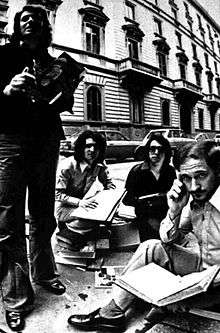Homo Sapiens (band)
Homo Sapiens (sometimes spelled as Gli Homo Sapiens) is an Italian pop-rock group, mainly successful in the seventies.

Homo Sapiens (1975)
Career
The group formed in the late 1960s as I Tarli.[1][2] They adopted the current name in 1972, and had their first success in 1975 with the ballad "Tornerai tornerò", which reached the ninth place on the Italian hit parade.[1][3]
The group won the 1977 Sanremo Music Festival with the song "Bella da morire", which was also a commercial success, peaking at second place on the hit parade.[1][3] After a further success with the song "Io e te stasera", the group disbanded in the early 1980s, then reunited in 1990.[2][3]
Discography
- Albums
- 1974 - Homo Sapiens (Ri-Fi, RDZ ST 14238)
- 1975 - Tornerai, tornerò (Ri-Fi, RDZ ST 14258)
- 1976 - Pecos Bill (Ri-Fi, RDZ ST 14269)
- 1977 - Bella da morire (Ri-Fi, RDZ ST 14278)
- 1978 - Due mele (Ri-Fi, RDZ ST 14294)
- 1980 - Homo Sapiens (Harmony)
- 1990 - Presagio di mare (Voltage, CD 57027)
- 1994 - I comandamenti e...altre storie (Duck Record, DGCD 098)
- 1998 - 30 anni in una sera (Doppio)
gollark: There is not one, unless the nitro thing hides it somehow which would be weird.
gollark: If styro was the owner he would have a crown icon.
gollark: Very interesting.
gollark: So if you get STFU and manage roles you can take over the server? Interesting.
gollark: What an excellent pyrobot feature idea.
References
- Eddy Anselmi. Festival di Sanremo: almanacco illustrato della canzone italiana. Panini Comics, 2009. ISBN 8863462291.
- Enrico Deregibus. Dizionario completo della Canzone Italiana. Giunti Editore, 2010. ISBN 8809756258.
- Dario Salvatori. Storia dell'Hit Parade. Gramese, 1989. ISBN 8876054391.
External links
- Official website
- Homo Sapiens at AllMusic
- Homo Sapiens discography at Discogs
| Awards and achievements | ||
|---|---|---|
| Preceded by Peppino di Capri with "Non lo faccio più" |
Sanremo Music Festival Winner 1977 |
Succeeded by Matia Bazar with "E dirsi ciao" |
This article is issued from Wikipedia. The text is licensed under Creative Commons - Attribution - Sharealike. Additional terms may apply for the media files.